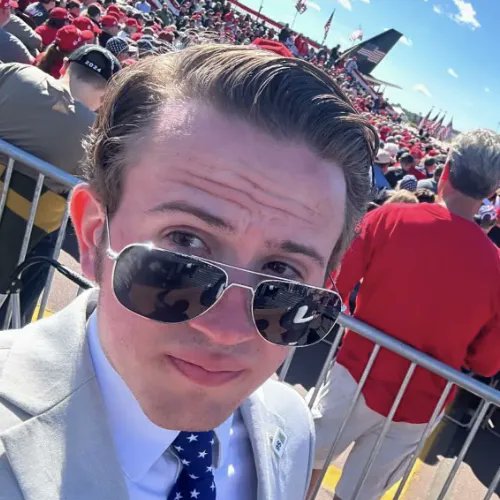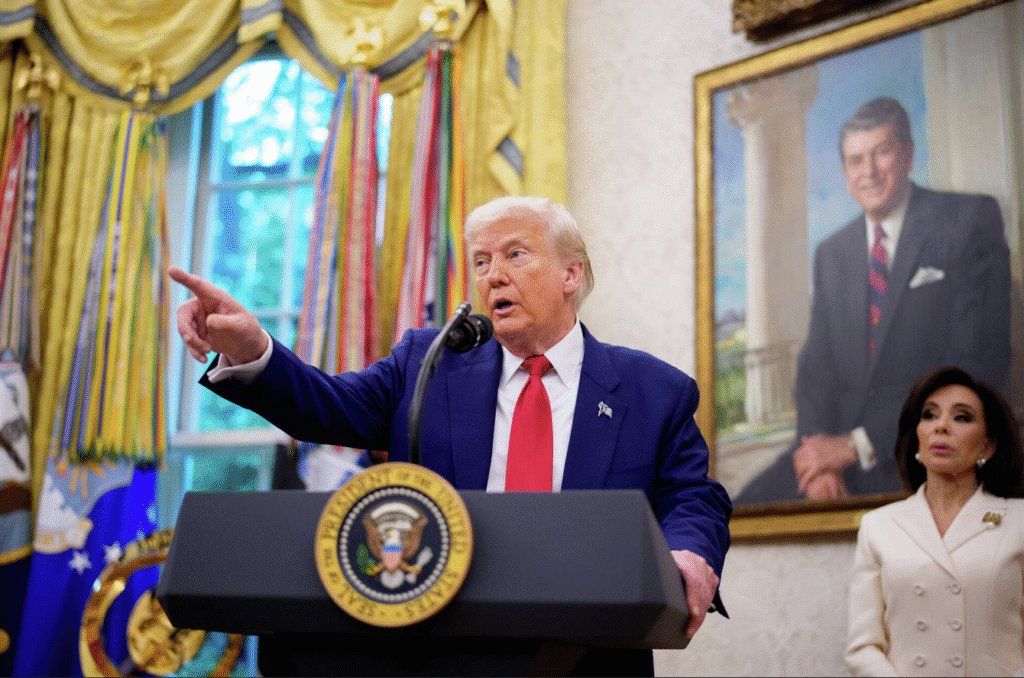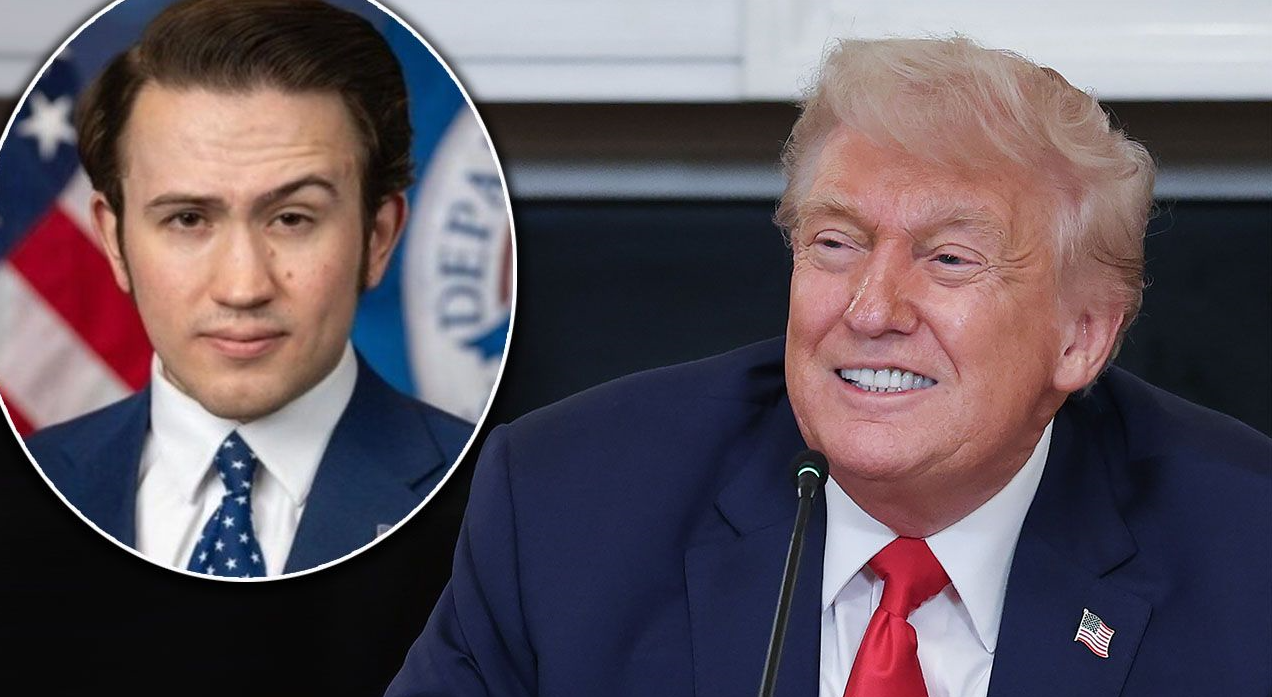Amid escalating tensions with Iran, 22-year-old Thomas Fugate’s appointment to a top terrorism-prevention role by Donald Trump is sparking backlash and debate. Who is Thomas Fugate and why is this pick so controversial?

A Bold Appointment Amid Global Crisis
In a move that has raised eyebrows across Washington and beyond, President Donald Trump appointed 22-year-old Thomas Fugate to lead one of the nation’s key terrorism prevention initiatives. As tensions flare with Iran and U.S. officials warn of potential domestic threats, the political world is asking: Who exactly is Fugate—and is he ready for this critical national security role?
Who is Thomas Fugate?
From H-E-B Clerk to Homeland Security Leadership
Thomas Fugate graduated magna cum laude in 2024 from the University of Texas at San Antonio with a degree in politics and law. But unlike seasoned national security experts, Fugate’s resume includes part-time work at a supermarket, neighborhood lawn care, and internships at conservative institutions like the Heritage Foundation.

He refers to himself as a “Trumplican” and has documented his political rise via social media. From handing out candy at GOP events to attending Trump’s birthday at Club 47 in Florida, Fugate’s loyalty to Trump is crystal clear—and likely what landed him the CP3 position.
What Is CP3 and Why Does It Matter?
The Center for Prevention Programs and Partnerships (CP3) is part of the Department of Homeland Security (DHS). Its mission: prevent domestic terrorism and violent extremism. Since 2020, CP3 has issued nearly $90 million in grants to local initiatives across the country.
Former CP3 director William Braniff, an Army veteran with over 20 years of counterterrorism experience, resigned in protest earlier this year. He cited cuts to staff and mission under the Trump administration and warned against diminishing CP3’s role, calling it the inheritor of DHS’s founding goal—preventing terrorism on U.S. soil.
Criticism from Experts and Lawmakers
Fugate’s promotion to lead CP3 following Braniff’s departure has triggered a storm of criticism. Counterterrorism researchers, lawmakers, and former DHS officials are alarmed at placing someone with zero national security experience in a role critical to domestic safety—especially amid threats of Iranian retaliation.
Senator Chris Murphy posted sharply on X (formerly Twitter):
As our nation girds for possible Iranian terrorist attacks, this is the person Trump put in charge of terrorism prevention.
— Chris Murphy 🟧 (@ChrisMurphyCT) June 22, 2025
22 years old. Recent work experience: landscaping/grocery clerk.
Never worked a day in counter-terrorism. But he’s a BIG Trump fan. So he got the job. pic.twitter.com/FIlMWFoudZ
“As our nation girds for possible Iranian terrorist attacks, this is the person Trump put in charge of terrorism prevention. 22 years old. Landscaping. Grocery clerk. No counter-terrorism experience. But a BIG Trump fan.”
Critics argue the appointment isn’t just about inexperience—it reflects a politicization of national security, reducing merit-based roles to loyalty-based rewards.
Rising MAGA Star: Fugate’s Swift Political Ascent
While the backlash is fierce, there’s no denying Fugate’s rapid rise. Within months of graduating, he became a fixture at GOP events, interned at key conservative think tanks, and worked on Trump’s 2024 campaign.
In photos across Instagram and other platforms, Fugate can be seen celebrating with Trump supporters, attending high-profile events, and rubbing shoulders with political influencers like Ben Carson and Matt Gaetz. His captions ooze enthusiasm:
“Surreal and invigorating.”
“A generation deprived of hope, opportunity, and happiness… I saw in one man the capacity for real and lasting change: Donald Trump.”
His passion for the movement and his visibility in MAGA circles undoubtedly helped pave his path to a White House-appointed position.
Reactions from CP3 Staff
Behind closed doors, however, Fugate’s leadership is reportedly causing unease among DHS personnel. According to reports from ProPublica, staffers describe meetings with him as “career counseling sessions” and are stunned at his lack of understanding of the role’s responsibilities.
One CP3 grant recipient called his appointment “an insult” to the progress made in depoliticizing and professionalizing terrorism prevention work.
A counterterrorism official quoted by ProPublica was blunt:
“It sounds like putting the intern in charge.”
DHS Responds: From Criticism to Counterclaims
The Department of Homeland Security responded to the backlash, telling the Daily Beast that CP3 had become “ineffective” and “politicized” under the Biden administration. DHS claimed the office had been used to funnel funds to “progressive groups” and that Fugate’s assignment was part of a broader reform.

“The Trump administration is making a diligent effort to end waste, fraud, and abuse—this office is just another example,” the spokesperson said.
They added that Fugate was temporarily granted “additional leadership responsibilities” due to his “success” in prior roles.
Is Loyalty Replacing Expertise in National Security?
Fugate’s story reflects a broader shift under the Trump administration—one where personal loyalty often trumps professional qualifications. Supporters argue that bringing in fresh perspectives is necessary, especially to clean up what they see as bureaucratic bloat. Detractors, however, warn of the danger in sidelining subject-matter experts in favor of political insiders, especially in national security roles.
As one former DHS official said : “The big story here is the undermining of democratic institutions… Who’s going to volunteer to be the next civil servant if they think their supervisor is an apparatchik?”
Fugate’s appointment highlights the tension between political loyalty and professional credibility in governance. It raises a fundamental question for voters and policy makers alike: Should key national security roles be entrusted to passionate political newcomers—or seasoned experts who’ve spent decades understanding threats?
Thomas Fugate may be a rising political star with undeniable passion for his cause. But his appointment to a high-stakes terrorism prevention office during a period of heightened international risk has set off alarm bells across the security establishment. Whether his leadership proves transformative or detrimental remains to be seen, but for now, his role reflects a new chapter in American governance—where ideology often outweighs experience.
Also Read :
US Prioritizes Safety : ‘Worldwide caution’ Travel Alert for Americans After Strategic Iran Strike
U.S. Bombs Iran Updates : Trump Declares Nuclear Threat Wiped Out by Targeted Attacks
Israel Attacks Iran: Full Breakdown of Escalating Conflict, Nuclear Threats, and Global Fallout

